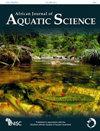Perspectives on Protecting African freshwater Ecosystems in the Anthropocene
IF 1
4区 环境科学与生态学
Q3 MARINE & FRESHWATER BIOLOGY
引用次数: 0
Abstract
Our announcement of this Special Medal Issue in 2020 outlined the growing and urgent concern for the state of Earth’s inland waters, and called on authors to submit papers that would address one or more of the following topics and, importantly, links between them: • water quantity: flow, inundation, groundwater recharge • water quality: dissolved and particulate matter, temperature • sediments, geomorphic structure, hydraulics: load, extraction, channel form and function, habitats • freshwater species: natural community structure, life cycles, exploitation, poaching • non-native species: invasions, habitat destruction, imbalance, escalation to pest proportions • connectivity: the movement of water, sediments and biota • livelihoods: social and cultural dependence on freshwater ecosystems • governance: socio-economic drivers of degradation, balancing the three pillars of sustainable development (social equity, ecological integrity, economic wealth). We sought papers from freshwater, resource economic and social scientists; water managers; governments; legislators; and other relevant specialists, encouraging co-authorship from more than one discipline in order to move closer to the realities of managing water ecosystems and addressing the requirements of their users. We hoped for information on the collaboration between disciplines, the use of knowledge as well as data, and how technical information can be conveyed in a form accessible to a wide range of stakeholders. The call for papers resulted in submission of papers from across southern Africa. Several of these did not address the science-management interface in any formal way and, because they had considerable merit, were referred to one of the scheduled issues of AJAS. The papers presented in the Special Medal Issue all have a link through to management, albeit stronger in some cases than in others. They progress our thinking regarding the management and sustainable use of freshwater ecosystem, but do they go far enough? We will return to this later. The papers have been arranged in three themes: freshwater ecosystem stressors; river basin and freshwater ecosystem management; and a case study. freshwater ecosystem stressors人类世保护非洲淡水生态系统的展望
我们在2020年宣布了这一特别奖章,概述了人们对地球内陆水域状况日益增长的紧迫关注,并呼吁作者提交论文,讨论以下一个或多个主题,重要的是,讨论它们之间的联系:•水量:流量、淹没、地下水补给•水质:溶解物和颗粒物,温度•沉积物、地貌结构、水力学:负载、提取、渠道形式和功能、栖息地•淡水物种:自然群落结构、生命周期、开发、偷猎•非本地物种:入侵、栖息地破坏、失衡、害虫比例升级•连通性:水的流动,沉积物和生物群•生计:对淡水生态系统的社会和文化依赖•治理:退化的社会经济驱动因素,平衡可持续发展的三大支柱(社会公平、生态完整、经济财富)。我们向淡水、资源经济和社会科学家寻求论文;水务管理人员;政府;立法者;以及其他相关专家,鼓励多个学科的合作,以便更接近管理水生态系统的现实并满足其用户的要求。我们希望了解学科之间的合作、知识和数据的使用,以及如何以广泛的利益相关者可以获得的形式传达技术信息。由于要求提供文件,南部非洲各地都提交了文件。其中一些没有以任何正式的方式处理科学管理界面,因为它们有相当大的优点,所以被提到了AJAS的预定问题之一。《特别奖章》上发表的论文都与管理层有联系,尽管在某些情况下比其他情况下更强。它们促进了我们对淡水生态系统管理和可持续利用的思考,但它们还不够吗?我们稍后再讨论这个问题。论文分为三个主题:淡水生态系统压力源;流域和淡水生态系统管理;以及一个案例研究。淡水生态系统压力源
本文章由计算机程序翻译,如有差异,请以英文原文为准。
求助全文
约1分钟内获得全文
求助全文
来源期刊

African Journal of Aquatic Science
MARINE & FRESHWATER BIOLOGY-
CiteScore
3.90
自引率
7.10%
发文量
31
审稿时长
>12 weeks
期刊介绍:
The African Journal of Aquatic Science is an international journal devoted to the study of the aquatic sciences, covering all African inland and estuarine waters. The Journal publishes peer-reviewed original scientific papers and short articles in all the aquatic science fields including limnology, hydrobiology, ecology, conservation, biomonitoring, management, water quality, ecotoxicology, biological interactions, physical properties and human impacts on African aquatic systems.
 求助内容:
求助内容: 应助结果提醒方式:
应助结果提醒方式:


